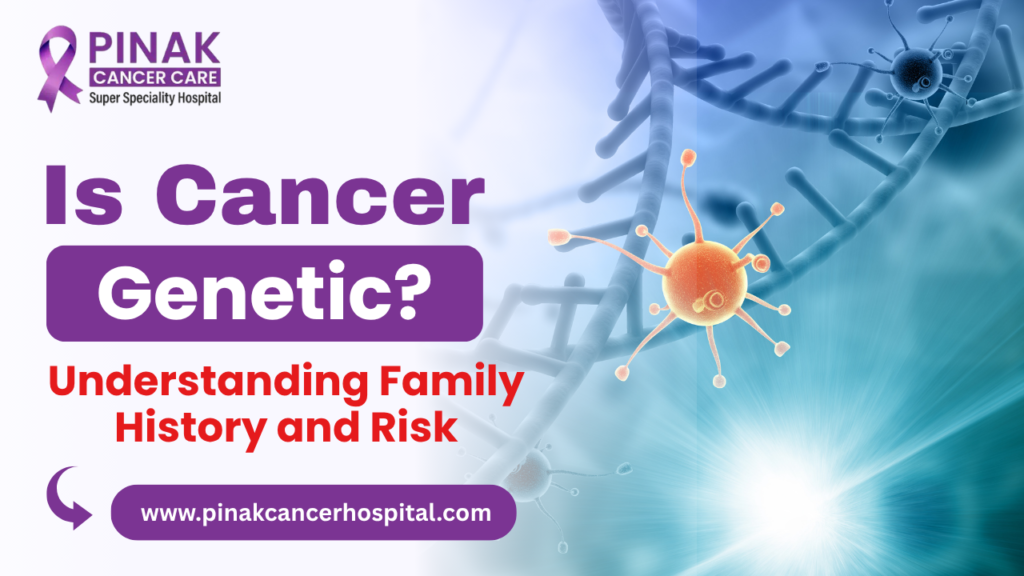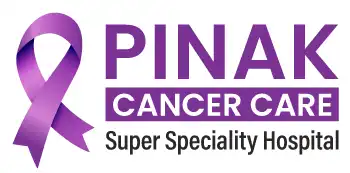
Cancer is one of the most feared diseases globally, and with good reason. It affects millions of lives every year. While lifestyle and environmental factors are often discussed as major contributors to cancer, many people are surprised to learn that genetics can also play a crucial role.
But how much does your family history impact your risk of developing cancer? Is cancer truly genetic? Let’s explore the answers to these questions and more in this comprehensive guide presented by Pinak Cancer Care & Superspecialty Hospital, where Dr. Pankaj Singh—widely recognized as the best oncologist in Varanasi—shares expert insights into the role of genetics in cancer.
1. What Does It Mean for Cancer to Be Genetic?
When we say cancer is “genetic,” we mean it is related to changes or mutations in our genes. These changes can affect how cells grow, divide, and die. Every cancer is caused by genetic mutations, but not all cancers are inherited.
About 5% to 10% of cancers are strongly linked to inherited genetic mutations. The rest are sporadic, meaning they occur randomly or due to environmental or lifestyle factors, such as smoking, diet, and exposure to toxins.
2. Difference Between Hereditary and Sporadic Cancer
Hereditary cancer results from gene mutations passed from parents to children. These mutations are present in every cell of the body and can significantly increase the risk of developing certain cancers.
Sporadic cancer, on the other hand, arises from mutations acquired over a lifetime. These mutations are not inherited and usually affect only a specific group of cells.
3. Types of Cancers That Can Run in Families
Several cancers show a familial or hereditary pattern. Some of the most common include:
- Breast cancer
- Ovarian cancer
- Prostate cancer
- Colorectal cancer
- Pancreatic cancer
- Melanoma
If multiple members in your family have had any of the above cancers, especially at a young age, it may indicate a hereditary cancer syndrome.
4. Role of Genes and Mutations
Genes are like the body’s instruction manual. They control cell growth and division. When a mutation occurs, these instructions may become faulty, leading to uncontrolled cell growth—a hallmark of cancer.
Two major gene types are involved:
- Oncogenes: Promote cell growth. Mutations turn them “on” permanently.
- Tumor suppressor genes: Prevent uncontrolled growth. Mutations turn them “off.”
Common Genetic Mutations in Cancer:
- BRCA1 and BRCA2: Linked to breast and ovarian cancer.
- TP53: Associated with Li-Fraumeni syndrome.
- MLH1 and MSH2: Related to Lynch syndrome (colorectal cancer).
5. Common Hereditary Cancer Syndromes
Several well-known hereditary syndromes significantly increase cancer risk:
1. Hereditary Breast and Ovarian Cancer Syndrome (HBOC)
- Caused by BRCA1/2 mutations.
- Increases the risk of breast, ovarian, prostate, and pancreatic cancer.
2. Lynch Syndrome
- Increases the risk of colorectal, endometrial, stomach, and other cancers.
3. Li-Fraumeni Syndrome
- Linked to TP53 mutation.
- Associated with breast cancer, brain tumors, leukemia, and sarcomas.
4. Familial Adenomatous Polyposis (FAP)
- Causes hundreds of colon polyps.
- Almost always leads to colon cancer if untreated.
6. Genetic Testing: Should You Get It?
If you have a strong family history of cancer, genetic counseling and testing can help assess your risk. Testing involves analyzing your DNA—usually through a blood or saliva sample—to identify specific mutations.
Consider genetic testing if:
- You have multiple family members with the same type of cancer.
- Cancers occurred at an early age.
- You or a relative has a known mutation (like BRCA1).
At Pinak Cancer Hospital, we provide comprehensive genetic risk assessment and testing, supported by the expertise of Dr. Pankaj Singh, a trusted name in cancer genetics and preventive oncology.
7. Preventive Measures If You Have a Family History
Knowing your genetic risk empowers you to take proactive steps. These may include:
- Regular screening and early detection (e.g., mammograms, colonoscopy)
- Preventive surgery (e.g., mastectomy for BRCA mutations)
- Medications (e.g., tamoxifen for breast cancer risk reduction)
- Lifestyle changes (healthy diet, exercise, no smoking/alcohol)
Dr. Pankaj Singh and his team at Pinak Cancer Care work closely with patients to create personalized prevention plans based on genetic risk.
8. How Pinak Cancer Hospital Helps High-Risk Individuals
As the best cancer hospital in Varanasi, Pinak Cancer Care & Superspecialty Hospital offers a multidisciplinary approach to hereditary cancer risk. Our services include:
✅ Genetic counseling
✅ DNA testing and interpretation
✅ Personalized screening strategies
✅ Risk-reducing treatments
✅ Psychological support
Our advanced molecular diagnostics lab and compassionate staff ensure that every patient receives world-class care and attention.
9. Why Choose Dr. Pankaj Singh for Genetic Risk Consultation?
Dr. Pankaj Singh is a renowned cancer specialist in Varanasi with vast experience in treating hereditary and genetic cancers. His approach combines:
- Cutting-edge oncology knowledge
- Evidence-based prevention methods
- Personalized treatment plans
- Empathetic patient care
Whether you need a second opinion, genetic testing, or long-term cancer surveillance, Dr. Pankaj Singh at Pinak Cancer Hospital is the name you can trust.
Conclusion
You can save your life by being aware of your family history and genetic cancer risk. You may make informed healthcare decisions, get regular checkups, and take immediate preventative action if potential red flags are identified early.
At Pinak Cancer Care & Superspecialty Hospital, we’re committed to early detection, education, and aggressive cancer prevention. Under the leadership of Dr. Pankaj Singh, Varanasi’s leading oncologist, we provide state-of-the-art care to patients with inherited cancer risk.
For a consultation or if you have any questions about the genetics of cancer, get in touch with us right now.
Book your Consultation Today
- Address: Amara, Bypass, Awaleshpur, Akhari, Uttar Pradesh 221005
- Book an appointment 👉: PINAK CANCER CARE & Superspecialty Hospital
- Website 👉: https://pinakcancerhospital.com/
- Follow us on 👉 Instagram & Facebook.
Frequently Asked Questions
Q1. Is cancer always inherited?
No. Only about 5-10% of cancers are inherited. The rest result from environmental or lifestyle factors.
Q2. What is the difference between genetic and hereditary cancer?
All cancers are genetic (involving mutations), but only some are hereditary (passed from parents).
Q3. If my parent had cancer, would I get it too?
Not necessarily. It depends on the type of cancer and whether a hereditary gene mutation is present.
Q4. Should I get genetic testing if no one in my family has had cancer?
Genetic testing is usually recommended when there’s a strong family history, but your doctor can help assess individual risk factors.
Q5. Can lifestyle changes reduce inherited cancer risk?
Yes. Even if you have a genetic predisposition, lifestyle modifications and early screening can greatly reduce your risk.
Q6. Can children inherit cancer?
Children can inherit a predisposition to cancer, not the disease itself. That means they are at a higher risk, but not guaranteed to develop it.
